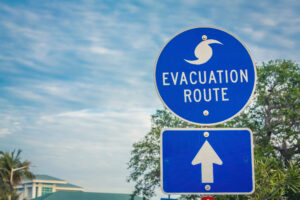As a homeowner, it is crucial to protect your property and ensure your family’s safety by preparing for a hurricane or tropical storm. These severe weather events can cause significant damage and pose a serious threat, so it is essential to take proactive steps before the storm hits.
Here are some tips to help you prepare ahead of the hurricane season and keep your home secure and protected:
Know the Two Types of Alerts: Hurricane Watch and Warning
When it comes to hurricanes, it is important to understand the difference between a hurricane “watch” and “warning.” These terms are used by the National Weather Service to alert residents in coastal areas of potential storm conditions. It is crucial to stay up-to-date on the latest alerts and to know the difference between the two:
- A hurricane watch means that hurricane conditions, such as sustained winds of 74 miles per hour or higher, are possible in a stated area. Hurricane watches are typically announced 48 hours before experts expect tropical-storm-force winds (sustained winds of 39 to 73 mph) to start. If a hurricane watch is issued, it is important to start preparing for the storm, such as stocking up on supplies and securing your property.
- A hurricane warning is more serious and means that hurricane-force winds are expected in a stated area. Experts issue these warnings 36 hours before tropical-storm-force winds are expected in the area to give people enough time to prepare for the storm. If a hurricane warning is issued, it’s important to follow evacuation orders and take necessary precautions to ensure your safety.
It is important to listen for National Weather Service alerts on TV or radio, or check for them online, to stay informed about any hurricane watches or warnings in your area. By knowing the difference between the two and taking the necessary steps to prepare, you can help protect yourself, your loved ones, and your property from the potential impacts of a hurricane.
Develop an Emergency Plan for Your Family and Pets
One of the most important steps in preparing for hurricane season is developing an emergency plan for your family and pets. Here are some tips to help you get started:
- Discuss the plan with your family: Talk with your family about what to do in case of a hurricane. Make sure everyone knows the evacuation routes and designated meeting spots. Have a plan in place for how to communicate with each other if you are separated during the storm.
- Plan for your pets: Make sure you have a plan in place for your pets, including how to transport them if you need to evacuate. Consider contacting local shelters or pet-friendly hotels to see if they accept pets during emergencies. Have a pet emergency kit ready with food, water, medication, and other supplies.
- Consider your transportation needs: If you need to evacuate, how will you transport your family members and pets? Make sure your vehicles are in good condition and have enough fuel. If you don’t have a vehicle, plan on how you’ll evacuate with public transportation, a ride from friends or family, or other options.
- Determine a meeting place: In case you get separated from your family members or pets during an emergency, designate a meeting place where you can all regroup. Make sure everyone knows the address and how to get there.
- Plan for special needs: If any members of your family or pets have special needs, such as medication or medical equipment, make sure to include those in your emergency plan. Have a backup supply of medication and keep important medical records in a waterproof container.
- Identify a safe room: If you’re unable to evacuate, identify a safe room in your home where your family and pets can take shelter during the storm. This room should be on the lowest level of your home, away from windows, and have enough space for everyone to comfortably fit.
- Prepare for the aftermath: In addition to preparing for the storm itself, make sure you have a plan for what to do after the storm has passed. This includes assessing damage to your home, finding alternative housing if necessary, and seeking medical attention if anyone is injured.
By taking the time to develop an emergency plan for your family and pets, you can help ensure that everyone stays safe and prepared during hurricane season.
Prepare Your Emergency Kit and Stock Up on Supplies
In the event of a hurricane or other natural disaster, it is important to have a kit with essential supplies like water, non-perishable food, first aid items, and flashlights. The CDC has a great resource on preparing for hurricanes that you can reference for more information. Putting together an emergency kit can give you peace of mind and ensure that you are ready to handle any unexpected situations.
In addition to your emergency kit, you will also need to stock up on essential supplies before a storm hits. This can include non-perishable food and bottled water, a first aid kit, flashlights and extra batteries, cash, and important documents like insurance policies and identification. You may also want to consider purchasing a portable generator or a backup power source to keep essential appliances running if you lose power.
Be sure to check your supplies regularly and replace any expired items. It is also a good idea to have a plan for how you will obtain additional supplies if needed, such as after a storm has passed and access to stores is limited. By being prepared and having the necessary supplies on hand, you’ll be better equipped to weather any storm that comes your way.
Know your Evacuation Zone

You may have to evacuate quickly due to a hurricane if you live in an evacuation zone. It is important to know your evacuation zone ahead of time so that you can act quickly when an evacuation order is issued. Check with your local emergency management office or visit their website to find out if you live in an evacuation zone.
Once you know your evacuation zone, learn your evacuation routes, practice with your household and pets, and identify where you will stay. Consider staying with friends or family outside of the affected area or locate a nearby shelter. Make sure to have a plan in place ahead of time and know how you will get there.
It is crucial to follow the instructions from local emergency managers, who work closely with state, local, tribal, and territorial agencies and partners. They will provide the latest recommendations based on the threat to your community and appropriate safety measures. Be sure to keep up to date on any changes to evacuation orders and take them seriously. Remember, your safety is the top priority.
Prepare Your Property
Taking steps to secure your property before a hurricane hit can help minimize damage and keep you and your family safe. Some important steps to take include:
- Clearing gutters and drains to prevent water buildup
- Trimming trees and shrubs to reduce the risk of falling branches
- Securing loose outdoor items like patio furniture and grills
- Boarding up windows or installing storm shutters
- Reinforcing garage doors
Opening Protection Check
If you have hurricane shutters, panels, or netting installed on your home, it is important to check them before hurricane season begins. Here are some steps you can take to ensure that your opening protection is in good shape:
- Pull out your hurricane shutters, panels, or netting to ensure that you have all the panels and bolts. If any are damaged or missing, replace them before a storm hits.
- If you have roll-down shutters, make sure that they are in good working order. Test them to make sure that you can roll them down easily or apply a lubricant like WD-40 if necessary.
- Perform a dry run of putting up your hurricane shutters or panels. This will help you determine how long it takes to put them up and whether you need any assistance. It’s much better to do this before a storm arrives, rather than trying to install them in high winds.
- If you do not have dedicated protection, consider purchasing plywood pre-cut to size, tapcons, and any other necessary equipment. Make sure you store them in a dry area so that they are ready to use when a storm approaches.
- Make sure that you have all the necessary equipment to install your opening protection. It can be hard work if you don’t know what you’re doing or don’t have the correct tools. Having everything you need ahead of time will save you time and frustration when a storm is approaching.
By taking these steps to check your opening protection before hurricane season begins, you can ensure that your home is properly protected during a storm. Remember, being prepared is the key to staying safe during hurricane season.
In conclusion, preparing ahead of hurricane season is crucial for ensuring the safety and well-being of yourself and your loved ones. By following these five tips and taking proactive measures, you can significantly reduce the risks and damages associated with hurricanes. Remember to stay informed, create a plan, gather supplies, secure your property, and have an evacuation strategy in place. With the right preparation and mindset, you can weather any storm that comes your way. Stay safe!
References:
Centers for Disease Control and Prevention. (n.d.). Preparing for Hurricanes. Retrieved from https://www.cdc.gov/disasters/hurricanes/before.html.
Ready. (n.d.). Prepare for Hurricanes. Retrieved from https://www.ready.gov/hurricanes.

